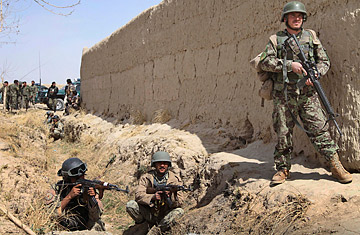
Afghan security forces stand alert on March 13, 2012, after Taliban militants opened fire on a delegation of senior Afghan officials in Panjwai, Kandahar province, Afghanistan
Shots rang out again Tuesday, March 13, at the site of Sunday's massacre of 16 Afghan civilians, as a high-ranking Afghan government delegation left a village mosque after paying their respects to the families of the dead. The group, which included two of President Hamid Karzai's brothers, had been in Kandahar's Panjwai district to investigate the early-Sunday shootings by an American soldier. "We were coming out of a mosque when suddenly the Taliban began shooting," Hajji Agha Lalai Dastagiri, head of the Kandahar provincial council, told TIME soon after his group came under fire — highlighting the shaky situation in the district.
Earlier in the day, Taliban spokesman Zabihullah Mujahid had said in a statement that the group "once again warns the American animals that the mujahedin will avenge them and with the help of Allah will kill and behead your sadistic murderous soldiers." After hundreds of villagers gathered in Panjwai on Monday to protest the murders, Dastagiri said the mood of the people in Panjwai, a restive district west of Kandahar City, was somber and that people were "very angry about the actions of this American soldier." It was hard to say whether those who fired on the government delegation were Taliban fighters or angry villagers.
What is clear, however, is that outrage continues to grow across Afghanistan over the Panjwai atrocity, even as Karzai has called for calm and U.S. officials all the way up to President Barack Obama have apologized for the shootings. In the first large urban protest since the killings, about 400 students protested peacefully in the eastern city of Jalalabad, chanting "Death to America" and "Death to Obama," while some burned an effigy of the President. One banner read, "Jihad is the only way to get the invading Americans out of Afghanistan," AFP reported.
The invading Americans, of course, had planned to pull out of Afghanistan by the end of 2014, and Washington is weighing whether to withdraw troops earlier than planned. The U.S. has almost 90,000 troops in Afghanistan, but 22,000 of them will go home by September. And while Obama said last year that the pullout would continue "at a steady pace," he told a radio interviewer that the massacre has made him "more determined to make sure we're getting our troops home."
"It's time," Obama said. "It's been a decade, and frankly, now that we've gotten bin Laden, now that we've weakened al Qaeda, we're in a stronger position to transition than we would have been two or three years ago." But Obama also said, in a separate TV interview, that "we cannot allow these events to undermine our strategy or the mission that we're involved in."
At the same time, the White House sought to cool speculation that the bad blood created by the mass murder of civilians and the burning of Korans at Bagram air base just three weeks ago will fast-forward the withdrawal schedule. "I do not believe this incident will change the timetable of a strategy that was designed and is being implemented in a way to allow for the withdrawal of U.S. forces, to allow for their transfer of lead security authority over to the Afghans," White House press secretary Jay Carney told reporters.
Even though Afghans across the country have for years demanded the withdrawal of foreign troops, many fear that a hasty departure that would leave behind a weak national army would lead to civil war and anarchy of the sort that reigned upon the collapse of the communist government three years after the withdrawal of the Soviet military. "People want Americans to be here until they become fully self-sufficient," Dastagiri told TIME. "People now need American help — but they do not need this kind of cruel and inhuman action."
That sentiment is echoed by Wadir Safi, a lecturer in law and political science at Kabul State University. "The Americans must determine if they have fulfilled their job or not," Safi says. "The U.S. must think if they can really leave in 2013 or 2014. If they leave without reaching an agreement with the government and the insurgents, what will be the consequences of a withdrawal? If we can reach an agreement now, I would ask the Americans to go tomorrow, but if not, then they must stay here until they are sure that things will not become worse than they were 10 years ago, before they came." Leaving behind chaos in Afghanistan "will show that the U.S. is not a superpower," Safi warns.
That thought is echoed by Daud Sultanzoy, a former member of parliament and opposition politician. "Just because a lunatic does something does not mean the U.S. should shirk their responsibilities to Afghanistan," Sultanzoy says. "It is their decision, but if they shirk their responsibilities, they are not the superpower they claim to be. A superpower acts not only according to their own needs but also to their responsibilities."
